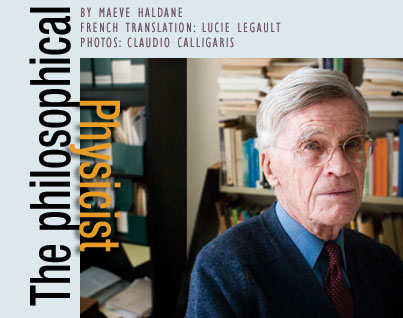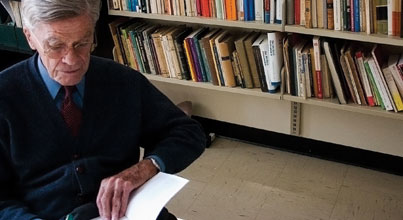English translation: The Philosophical Physicist
English translation: The Philosophical Physicist McGill University
User Tools (skip):

McGill's Frothingham Professor of Logic and Metaphysics Mario Bunge is an internationally renowned philosopher of science. He's written hundreds of papers and dozens of books, including the Philosophy of Science in two volumes, and his eight-volume Treatise on Basic Philosophy. Bunge has been a visiting professor in Europe, Latin America and a visiting fellow at the University of New South Wales.
At 85, he's as active a scholar as any academic half his age. A lively conversationalist with an interest in the arts, he's currently reading Thackeray's Vanity Fair, "Something I should have read 60 years ago," and revelling in its "despicable" characters.
"I'm a great fan of English literature. I used to be a fan of American literature but I think it's now decaying. I think there's more lively literature in Canada these days." A controversial figure himself, he's an ardent admirer of Margaret Atwood, her writing and political views.
"The only thing that I find objectionable about her is a statement she recently made: 'Science is just a tool, it's not something of the spirit.' Obviously she has no idea how much spirituality goes into science!"
Imagination is the essence of science, he believes, and Atwood makes an all-too-common mistake. Science, mathematics and technological innovation require tremendous ingenuity. "Science is the study of reality, but you can't study reality just by looking at it. You have to invent, to imagine ideas, hypotheses, theories. You have to make them up."
But Bunge believes there is a crucial difference between art and science. "Unlike the stories you make up in literature or religion, the scientific stories have to be checked - reality checked."
Social studies need to be similarly provable. "To qualify as science, the theories, the hypotheses have to be testable. They have to represent reality."
Over decades, Bunge's philosophy has explored the minutiae of physics, the broad themes of metaphysics and advanced realist theories of knowledge. Born in a politicized Argentina and informed by a voracious intellect and wide-ranging scope of learning, he likes to see science in the service of progressive thought.
Bunge observes two movements in academia today: emergence ("a finer and finer splitting into thousands of different sciences") and a convergence of disciplines where "people start to realize the frontiers among disciplines are arbitrary, are artificial." All social thought has biological, environmental, political, economic and cultural components.
Although he is an advocate of imaginative research and interdisciplinary collaboration, Bunge is a harsh critic of academic mergers he deems irresponsible and rife with shams. "Nowadays the latest is ‘biopoetics,’ the attempt to understand literature in biological terms. Imagine!
"You cannot skip the level of society, going straight from biology to poetry. You have to take many other things into account. Genetics is not going to explain to you Milton or Shakespeare. Or Margaret Atwood."

Hard numbers and social application are typical elements of the topics that intrigue Bunge. He was invited to present his views on sociology and crime at an international symposium on criminology in Cambridge last summer. "They were interested in me because of my study of social mechanisms," said Bunge.
He was excited when he read in the American Sociological Review of a recent statistical study showing that criminals in their mid- to late 20s who are offered jobs, even transitory ones, will renounce crime. "As unemployment declines, criminality does too," says Bunge, adding that when employment surged during the Clinton years in the States, homicides went down by half.
Bunge grew up in Argentina steeped in socialist thought. His German mother was a nurse who had worked in China and Argentina before the First World War. His Argentinian father - a doctor, leftist congressman and amateur sociologist - was a pioneer in social medicine who wrote a hefty bill recommending universal medicare in 1936, and translated Goethe in verse as a pastime.
"I was lucky growing up under his wing because at home I heard conversations on politics, sociology, medicine, literature," says Bunge.
Bunge studied physics and math at the Universidad Nacional de La Plata, from 1938 to 1944, during which time he started a school for workers that students could attend at the end of the workday. His efforts at popular education were shut down by the government five years later.
Bunge continued to work on nuclear and atomic physics under the tutelage of Guido Beck, a student of German physicist Werner Heisenberg and the first to propose the layer model of the atomic nucleus. All the while he studied philosophy on his own. In 1952, Bunge received his PhD, and subsequently worked on the puzzles of quantum mechanics.
"I spent 60 years of my life trying to understand quantum physics and I think I'm starting to understand it through the philosophical fog," he says. Just last year he published his most recent paper on the subject, proposing new variables to correctly represent the position and velocity of an electron. "I wanted to prove to myself that my brain was still capable of handling this sort of thing, in my 80s. I think I succeeded."
Being frustrated with the paucity of intellectual resources in Argentina, Bunge decided to leave the country in 1963. "Latin America has been in the shadow of the cross and the sword until rather recently. Under the shadow not much grows." He also feared a military dictatorship, which indeed came three years later. Had he stayed he is certain he would have been killed.
Accompanied by his second wife, mathematician Marta Bunge, he taught physics and philosophy in the United States. A fellowship at the University of Freiburg in Germany gave him the opportunity to his write his opus, Foundations of Physics, in which he organizes the most important theories of physics.
While in Europe, Marta was offered a postdoctoral appointment at McGill. "I wanted to follow my wife, of course," says Bunge, so he wrote Professor Raymond Klibansky, then chair of McGill's Philosophy Department, about available positions. Even though Yale had vied for the Bunges, they preferred to shun the States, because "most of the people in the universities were in favour of the [Vietnam] war, which we thought immoral."
And so in 1966 the Bunges settled in Montreal, where they raised two children and began their long association with McGill. (Marta was named an emeritus professor of mathematics in 2003.) Bunge has two children from his first marriage, one of whom lives in Argentina, the other in Mexico. He is proud of his offspring - "Three scientists and an architect, not bad!" - and is glad to found a home in such a culturally rich, multilingual city, although he missed his sons and friends in Argentina, as well as the lively public intellectual life of Latin America.
Even though he feels a freedom here in Canada, he is frustrated by the reactionary intellectual misconceptions that came about during the revolt in the 1960s against science that spread outward from Berkeley. "Some of the student leaders were misled by philosophers who said science is a tool of late capitalism - Habermas and all those charlatans - and so if you revolt against the establishment you have to reject science as well."
Those who came out of that trend call themselves leftist, but Bunge sees them as obscurantist and right-wing because they are unwilling to apply scientific standards to studying social problems, "and so they don't help their own cause."
Bunge is clearly an advocate of social science, a point that is lost on his detractors. "A typical trait of a right-winger is to try and prevent objective study of social reality because that's dangerous." He finds it telling that the Reagan administration cut funding to social science by half. "Right-wingers don't like serious social science."


